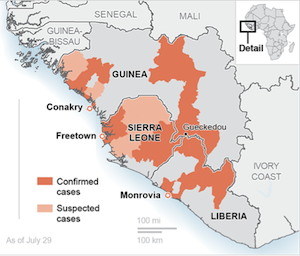An experimental Ebola drug healed all 18 monkeys infected with the deadly virus in a study, boosting hopes that the treatment might help fight the outbreak raging through West Africa -- once more of it can be made.
The monkeys were given the drug, ZMapp, three to five days after they were infected with the virus and when most were showing symptoms. That is several days later than any other experimental Ebola treatment tested so far.
The drug also completely protected six other monkeys given a slightly different version of it three days after infection in a pilot test. These two studies are the first monkey tests ever done on ZMapp.
"For animal data, it's extremely impressive," said Dr. Anthony Fauci, director of the National Institute of Allergy and Infectious Diseases, which had a role in the work.
"The level of improvement was utterly beyond my honest expectation," said one study leader, Gary Kobinger of the Public Health Agency of Canada in Winnipeg.
It's not known how well the drug would work in people, who can take up to 21 days to show symptoms and are not infected the way the monkeys were in a lab.
Several experts said it's not possible to estimate a window of opportunity for treating people, but that it was encouraging that the animals recovered when treated even after advanced disease development.
The study was published online Friday by the journal Nature.
ZMapp had never been tested in humans before two American aid workers who got Ebola while working in Africa were allowed to try it. The rest of the limited supply was given to five others.
There is no more ZMapp now, and once a new batch is ready, it still needs some basic tests before it can be tried again during the African outbreak, Fauci said. "We do need to know what the proper dose is" in people and that it's safe, he said.
Ebola has killed more than 1,500 people this year, and the World Health Organization says there could be as many as 20,000 cases before the outbreak is brought under control. On Friday, it spread to a fifth African country -- Senegal, where a university student who traveled there from Guinea was being treated.
There is no approved vaccine or specific treatment, just supportive care to keep infected patients hydrated and nourished. Efforts have focused on finding cases and tracking their contacts to limit the disease, which spreads through contact with blood and other fluids.
ZMapp is three antibodies that attach to cells infected with Ebola, helping the immune system kill them.
Of the seven people known to have been treated with ZMapp, two have died -- a Liberian doctor and a Spanish priest. The priest received only one of three planned doses. The two Americans recovered, as have two Africans who received ZMapp in Liberia -- a Congolese doctor and a Liberian physician's assistant who were expected to be released from a treatment center today. A British nurse also got the drug, reportedly the two unused doses left over from treating the Spanish priest.
Doctors have said there is no way to know whether ZMapp made a difference or the survivors recovered on their own, as about 45 percent of people infected in this outbreak have.
ZMapp's maker, Mapp Biopharmaceutical Inc. of San Diego, has said the small supply of the drug is now exhausted and that it will take several months to make more. The drug is grown in tobacco plants and was developed with U.S. government support.
With no treatment currently available, health officials in West Africa are trying to stop the spread of the disease using quarantines, border closures and flight bans for those infected. However, officials said the Senegal case illustrates the weakness in that strategy.
Now health officials must try to identify and monitor all of his contacts in Senegal's capital of Dakar, a metropolitan area with more than 2 million people that serves as a major transportation hub and popular destination for European tourists.
The student from Guinea finally showed up at a hospital in Dakar on Tuesday, seeking treatment but concealing that he had been in contact with other Ebola victims, Health Minister Awa Marie Coll Seck said.
The next day, an epidemiological surveillance team in neighboring Guinea alerted Senegalese authorities that they had lost track of a person they were monitoring three weeks earlier, and that the person may have crossed into Senegal.
The student, who is in satisfactory condition, was tracked down in the Dakar hospital the next day and immediately quarantined, Seck said. Authorities also sent out a team to disinfect the home where he was staying.
Senegal is among the African nations banning flights from Guinea, Sierra Leone, Liberia and Nigeria. Senegal also has closed major border crossings, but West Africa's frontiers are so porous that it would be impossible to seal borders altogether.
Information for this article was contributed by Babacar Dione and Sarah DiLorenzo of The Associated Press.
A Section on 08/30/2014
